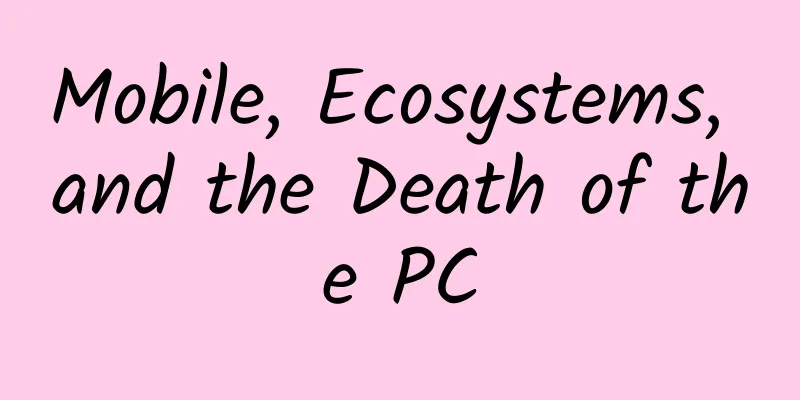Mobile, Ecosystems, and the Death of the PC

|
Technological progress is reflected in the large-scale replacement of devices and platforms. We all say that the PC is dead and welcome to the mobile era. But do we know what mobile is? Let's see what Benedict Evans thinks. One way technology advances is through large-scale generational changes. From mainframes, microcomputers, workstations, PCs, and now mobile, each generation brings about large-scale step changes. Excluding tablets, the sales ratio of iOS and Android smartphones to PCs has reached 5:1, and will even approach 10:1 in the next few years. So this is an ecosystem of a different scale than before. The scale of mobile devices has long surpassed that of PCs, but now smartphone shipments have surpassed PC shipments. Each generation first gains a certain scale and space by establishing a new market, and then after a period of time, it begins to cannibalize the market of the previous generation. More than 10 years ago, PCs were still sold as PCs, but later (due to server virtualization technology, etc.) they slowly killed workstations and controlled data centers. Will mobile be like this? Can mobile kill PCs? If so, how? Or do you have to use PCs for "real work"? Let history be our guide. In 1960, real work looked like this—a typewriter, a telephone, and an electromechanical adding machine. Each person is a cell in an Excel table Each person in the picture is a cell in a spreadsheet - the building is an Excel file, and the people on the top floor (management) would press F9 (recalculate shortcut key) every week and the whole building would start recalculating (such as business data). This was the real work at that time. Of course, 10 years later, the company purchased a mainframe and the adding machine was put aside. Then, in our era, every week, thousands of VPs in hundreds of companies would pull data from internal systems into Excel, make charts, paste them into PPT, write summaries, and then send PPTs to a bunch of shareholders. But in fact, their job is not to write PPTs but something else. PPTs are just tools, and PPTs should be real-time SaaS dashboards. The “real work” doesn’t change with new tools—first the tools adapt to the work, then the work adapts to the tools. Meanwhile, the "toys" are getting better. In 2000, if you were asked to list tasks that were unlikely to be web-enabled, CAD and video editing would probably be two of them. But now both are being done and done well. The number of things that can only be done on a PC is shrinking. Our mindset has changed, and the limited device is now the PC, not the smartphone (which has all sorts of sensors embedded in it and is connected to the cloud). So, each new generation of computing platforms will never be used to do real work (my definition of real work is obviously a bit limited here), but the platforms will get better and better, and then the work will adapt to the new platforms. In the technology world, the time frame for "never" seems to be only 5-10 years ('soon' is probably about that long too :)). OK, we say that tools change, so mobility changes, but what does that mean? What does "mobile" mean? "PC" - personal computer - covers a wide range of devices. Excluding ATMs, machine tools and the like, how many of the 1.5 billion or so PCs are actually owned by individuals, not families or businesses? Similarly, the word "mobile" is problematic. First, "mobile" is not really mobile (wireless cellular network). As we all know, most "mobile" device usage on the Internet is done through wifi. Most people use their mobile phones when they have a laptop nearby. "Mobile" device usage is relatively rare when walking on the street or in a cafe (the figure below is a survey of the UK, which is a problem in this judgment, not in developing countries). Mobile is not what it means If mobility isn’t where you are (on the go, outside) or where you’re connected (cellular), then what is it? Obviously there's another way to define it - "mobile" means no full-size keyboard, a smaller screen, and an operating system that doesn't multitask... well, except for "mobile" devices that have keyboards, large screens, or can multitask. But here's the question: what's the difference between an iPad and a Surface Pro? Are they both PCs? We know they should be different, but what's the important difference? How are these two different from a Macbook? How is a Lumia running Windows 10 plugged into a keyboard and screen? How is such a Lumia different from a Mac Mini with a keyboard and screen attached? Why? You can't define the difference between "mobile" and "PC" by screen size or keyboard. These devices have roughly the same screens and capabilities, so which one is considered a “mobile” device? It’s certainly not performance—at least not for a long time. The iPhone 6S beats the Macbook in some metrics, the iPad Air already beats last year’s Surface, and the iPad Pro will likely catch up to the Surface, so there’s not much point in discussing these. The curves of the Moore’s Law charts are converging for everything with a battery. The same is true for visible differences in software. It’s pretty shortsighted to say that PCs can be differentiated by multitasking and multi-windowing. That’s just software. Software changes. At the same time, for me, most of the form factor differences don't matter to the essence of the device anymore. It's a 502 glue thing. If I glue a keyboard to an iPad and put Office on it, has that made me a laptop? How many apps are running on those 1.5 billion PCs that won't run on an iPad? How many people will need those specific apps all the time? If I put Android on a Surface and put Office on it, what do I lose or gain? What's the difference between a "smartphone" and a "tablet" any more than a big-screen PC and a small-screen PC? Based on this, we should not think of "tablets and smartphones" as a different category from PCs, but as devices with larger or smaller screens. That is, you carry one thing with you (the "phone"), and you may or may not have a device with a larger screen at home or in the office. In the past you might have chosen between a laptop or a desktop, but now you have to choose between a laptop, a desktop, or a tablet, depending on what you want to use it for. So maybe we should think of tablets as "PCs" in the same category as desktops and laptops. Is a tablet a "mobile" device or a "PC"? If you think of all devices as belonging to the same spectrum, with no major differences between them, other than screen size and the presence or absence of a keyboard, that brings you to Windows 10. If "computer" is a set of basic capabilities across a wide range of form factors, and if "mobile" and "PC" are converging, then a single OS that can run on any of them seems like a good idea: take the foundations of the old ecosystem and spread them to new form factors, and just tweak the UI to take advantage of touch. Well, maybe. This is the IBM XT/370 from 1983. It was an IBM PC that ran Microsoft DOS, but it could also run commands from the (1970) S/370 mainframe via a plug-in card. The idea was great, customers were excited, and the product sold well. But it wasn't the future.
Let's compare again. In theory, a Lumia runs the same code as a Windows 10 "PC" and doesn't need to support a completely different code set. But the comparison between a Lumia running Windows 10 and a Surface is within the same ecosystem. Put the old ecosystem into a new form factor, yes. You might still sell some. But is it the future, or is it a new Chevy Camaro or Ford Mustang? Such products your old fans certainly like, but ignore Tesla and self-driving cars. Taking history one step further, let's look at the Republic Aircraft Corporation's XF-12 Rainbow. The XF-12 Rainbow was a four-engine propeller reconnaissance aircraft built at the end of World War II and is still the fastest piston-engine aircraft of its size. It was built with the largest possible stroke, which was even better than the jets of the time, but jets were the future and piston aircraft had no future (only two were built). Each generation of technology goes through an S curve of development—slow improvements on an immature product, then a burst of rapid improvement once the fundamental obstacles are resolved, then slow iterative optimizations, the curve flattening out as each critical problem is solved. Like the XF-12 Rainbow, PCs are already in the flattening phase. They’re perfect because you’re debugging the big things that were invented in the past, and now your innovations are in really small things (like the Rainbow’s use of exhaust for extra thrust), and there’s no room for big innovations. But at the same time, the new ecosystem is catching up, and soon it’s at the point where the old generation’s development and innovation curve is out of reach. That’s why they look similar—the Surface Pro and iPad Pro look the same. They’ve arrived at the intersection of the old and new curves. The iPad may be a little lower, but its momentum is upward. That is, the point at which you can start doing old ecosystem things on what appear to be new ecosystem equipment is also the point at which the new ecosystem can do the same things — but the new ecosystem is 10 times the size of the old one and is starting to follow the old ecosystem’s innovation path, while the old ecosystem’s path has reached its end. But if it’s not keyboards or big screens or multitasking, what’s the difference in the new ecosystem? What is “mobile”? I think there are four components:
So, the simple answer to this complex question is - we say "mobile" is not mobile just like we say "PC" is not personal computer. It's not about screen size or keyboard or where it's used. Instead, the ARM, iOS, Android ecosystem, 10 times the size of Wintel, will become the new center of gravity in computing. On the one hand, it will occupy things like IoT and wearables, and then in due course it will occupy the data center, and finally the desktop. The smartphone is the new sun. |
<<: Summary of 7 commonly used sorting algorithms in Java
>>: Why should we practice Code Kata?
Recommend
Dingxiangyuan's ingenious mechanism for free coffee cup growth campaign
DXY is China's leading medical connector and ...
SpongeBob says goodnight: Do animals without brains also need sleep?
I wake up to sleep while others sleep to wake up....
To Wang Xuehong: The best apology to shareholders is to sell HTC
Recently, HTC CEO Wang Xuehong bowed and apologiz...
Three tips to teach you how to successfully operate an APP
What does an APP need to do to retain users? 1. D...
Offline marketing activities process and techniques!
A little background information – a large-scale e...
Unexpectedly? WeChat is going to challenge the three major operators, and SIM cards may be replaced
Although WeChat is becoming more and more popular...
2016 China Short Video Industry Development Research Report!
summary 1. Content production and integrated plat...
US-China trade deficit hits new high, iPhone 6 helps
According to the Wall Street Journal, total U.S. ...
The man was found to be driving under the influence even though he had not drunk any alcohol. It turned out that he had this bacteria in his body! The treatment method is cruel...
One late night in April 2020, in the small town o...
I want to learn Baidu bidding promotion. Are there any recommended Baidu bidding promotion tutorials?
The most taboo for novices learning Baidu bidding...
To be honest, I really don’t have the urge to buy a gaming laptop now
Gaming laptops were once the mainstream product l...
7 taboos for eating mooncakes during the Mid-Autumn Festival that you must know
The Mid-Autumn Festival is approaching faster and...
How much does it cost to customize Dehong furniture through the mini program? What is the price quote for Dehong Furniture Mini Program customization?
There are two types of customization of Dehong Fu...
Must read! Case study of adding fans in the industry. It is not a problem to attract 10,000 fans a day~
A student who has just switched to information fl...
China's APP active user rankings in November 2016 (TOP450)
iiMedia Research, the world's leading third-p...









